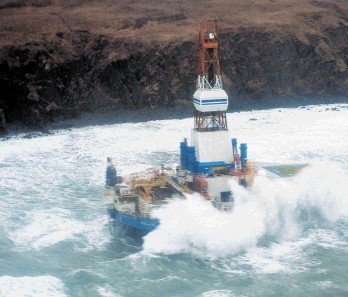
Noble Drilling has been charged with environmental and maritime crimes for operating the drill ship Noble Discoverer and the drilling unit Kulluk in violation of federal law in Alaska in 2012.
Under the terms of a plea agreement filed in the Alaskan federal court early last month, Noble Drilling (US) is pleading guilty to eight felony offences, will pay $12.2million in fines and community service payments, implement a comprehensive “environmental compliance plan”, and will be placed on probation for four years.
In addition, Noble’s parent, Noble Corporation plc which is headquartered in London, has agreed to implement an environmental management system covering its fleet of offshore rigs, wherever they operate in the world.
The Alaskan authorities basically threw the book at Noble Drilling (US), which was charged on eight counts including knowingly failing to maintain an accurate Oil Record Book and an accurate International Oil Pollution Prevention certificate, knowingly failing to maintain a ballast water record book, and knowingly and willfully failing to notify the US Coast Guard of hazardous conditions aboard the drill ship Noble Discoverer.
At the time the offences were committed, the Noble Discoverer was operating under contract to Shell, which intended to use them for drilling in the ice-bound Beaufort Sea.
After leaving its drilling location under tow, the Kulluk ultimately ran aground off the coast of Unalaska when it broke free in bad weather.
The Noble Discoverer, a converted log carrier, was dead-ship towed from Dutch Harbor to Seward due to failures with its main engine and other equipment. It also ran aground.
Noble has admitted that it knowingly made false entries and failed to record its collection, transfer, storage, and disposal of oil in the Noble Discoverer’s and the Kulluk’s oil record books in 2012.
Oil record book entries falsely reflected that the Noble Discoverer’s oil water separator (OWS) was used during periods of time when in fact the OWS was inoperable.
Noble had problems managing the bilge and wastewater that was accumulating in the engine room spaces of the Noble Discoverer. This and other conditions led to a number of problems.
Noble devised a makeshift barrel and pump system to discharge water that had entered the vessel’s engine room machinery spaces directly overboard from the Noble Discoverer without processing it through the required pollution prevention equipment as required by law.
Noble failed to notify the Coast Guard about this system, and took steps to actively hide the fact that it was being used.
In the plea agreement, Noble also admits that it negligently discharged machinery space bilge water from the Noble Discoverer into Broad Bay, Unalaska, on July 22, 2012.
While anchored in Dutch Harbor, the Noble Discoverer’s bilge holding tank 27S overflowed and went overboard, creating a sheen in Broad Bay.
Noble Corporation stated in a press release that it has taken responsibility for these actions and assisted in the investigation and in implementing changes in its vessel and management process.
It said that “concerns related to the Noble Discoverer have been addressed during the renovation and modernisation of the rig which occurred as part of an extensive shipyard programme conducted in Korea and Singapore”.
It has been reported locally in Alaska that Shell intends to carry on using the Discoverer in its next Beaufort Sea campaign.
And an extensive editorial in the Alaska Dispatch News is calling into question the competence of the US Coastguard to carry out inspections and issue approvals. Likewise, relevant federal agencies overseeing Shell’s plans are also criticised.
The paper stated: “So obviously, the safeguards in place to date have about as much teeth as a guppy. How do we know the repairs done truly take care of the problems with Noble Discoverer? Because Noble Drilling and Shell say so?”
Recommended for you
